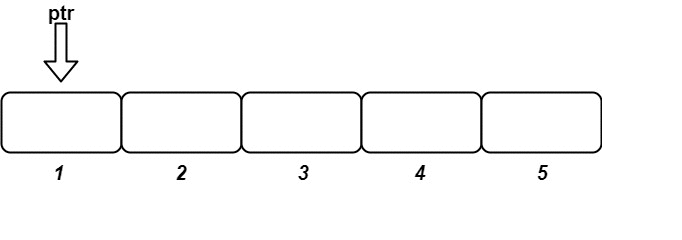有 n 个 (id, value) 对,其中 id 是 1 到 n 之间的一个整数,value 是一个字符串。不存在 id 相同的两个 (id, value) 对。
设计一个流,以 任意 顺序获取 n 个 (id, value) 对,并在多次调用时 按 id 递增的顺序 返回一些值。
实现 OrderedStream 类:
OrderedStream(int n)构造一个能接收n个值的流,并将当前指针ptr设为1。String[] insert(int id, String value)向流中存储新的(id, value)对。存储后:- 如果流存储有
id = ptr的(id, value)对,则找出从id = ptr开始的 最长 id 连续递增序列 ,并 按顺序 返回与这些 id 关联的值的列表。然后,将ptr更新为最后那个id + 1。 -
否则,返回一个空列表。
- 如果流存储有
示例:
输入 ["OrderedStream", "insert", "insert", "insert", "insert", "insert"] [[5], [3, "ccccc"], [1, "aaaaa"], [2, "bbbbb"], [5, "eeeee"], [4, "ddddd"]] 输出 [null, [], ["aaaaa"], ["bbbbb", "ccccc"], [], ["ddddd", "eeeee"]] 解释 OrderedStream os= new OrderedStream(5); os.insert(3, "ccccc"); // 插入 (3, "ccccc"),返回 [] os.insert(1, "aaaaa"); // 插入 (1, "aaaaa"),返回 ["aaaaa"] os.insert(2, "bbbbb"); // 插入 (2, "bbbbb"),返回 ["bbbbb", "ccccc"] os.insert(5, "eeeee"); // 插入 (5, "eeeee"),返回 [] os.insert(4, "ddddd"); // 插入 (4, "ddddd"),返回 ["ddddd", "eeeee"]
提示:
1 <= n <= 10001 <= id <= nvalue.length == 5value仅由小写字母组成- 每次调用
insert都会使用一个唯一的id - 恰好调用
n次insert
class OrderedStream:
def __init__(self, n: int):
self.data = [None] * n
self.ptr = 0
def insert(self, idKey: int, value: str) -> List[str]:
self.data[idKey - 1] = value
ans = []
while self.ptr < len(self.data) and self.data[self.ptr]:
ans.append(self.data[self.ptr])
self.ptr += 1
return ans
# Your OrderedStream object will be instantiated and called as such:
# obj = OrderedStream(n)
# param_1 = obj.insert(idKey,value)class OrderedStream {
private String[] data;
private int ptr;
public OrderedStream(int n) {
data = new String[n];
ptr = 0;
}
public List<String> insert(int idKey, String value) {
data[idKey - 1] = value;
List<String> ans = new ArrayList<>();
while (ptr < data.length && data[ptr] != null) {
ans.add(data[ptr++]);
}
return ans;
}
}
/**
* Your OrderedStream object will be instantiated and called as such:
* OrderedStream obj = new OrderedStream(n);
* List<String> param_1 = obj.insert(idKey,value);
*/class OrderedStream {
public:
vector<string> data;
int ptr = 0;
OrderedStream(int n) {
data.resize(n, "");
}
vector<string> insert(int idKey, string value) {
data[idKey - 1] = value;
vector<string> ans;
while (ptr < data.size() && data[ptr] != "") ans.push_back(data[ptr++]);
return ans;
}
};
/**
* Your OrderedStream object will be instantiated and called as such:
* OrderedStream* obj = new OrderedStream(n);
* vector<string> param_1 = obj->insert(idKey,value);
*/type OrderedStream struct {
data []string
ptr int
}
func Constructor(n int) OrderedStream {
data := make([]string, n)
return OrderedStream{data, 0}
}
func (this *OrderedStream) Insert(idKey int, value string) []string {
this.data[idKey-1] = value
var ans []string
for this.ptr < len(this.data) && this.data[this.ptr] != "" {
ans = append(ans, this.data[this.ptr])
this.ptr++
}
return ans
}
/**
* Your OrderedStream object will be instantiated and called as such:
* obj := Constructor(n);
* param_1 := obj.Insert(idKey,value);
*/class OrderedStream {
private ptr: number;
private vals: string[];
constructor(n: number) {
this.ptr = 0;
this.vals = new Array(n);
}
insert(idKey: number, value: string): string[] {
this.vals[idKey - 1] = value;
const res = [];
while (this.vals[this.ptr] != null) {
res.push(this.vals[this.ptr]);
this.ptr++;
}
return res;
}
}
/**
* Your OrderedStream object will be instantiated and called as such:
* var obj = new OrderedStream(n)
* var param_1 = obj.insert(idKey,value)
*/struct OrderedStream {
ptr: usize,
vals: Vec<Option<String>>,
}
/**
* `&self` means the method takes an immutable reference.
* If you need a mutable reference, change it to `&mut self` instead.
*/
impl OrderedStream {
fn new(n: i32) -> Self {
Self { ptr: 0, vals: vec![None; n as usize] }
}
fn insert(&mut self, id_key: i32, value: String) -> Vec<String> {
self.vals[(id_key - 1) as usize] = Some(value);
let mut res = Vec::new();
while self.ptr < self.vals.len() {
if let Some(s) = &self.vals[self.ptr] {
res.push(s.clone());
self.ptr += 1;
} else {
break;
}
}
res
}
}
/**
* Your OrderedStream object will be instantiated and called as such:
* let obj = OrderedStream::new(n);
* let ret_1: Vec<String> = obj.insert(idKey, value);
*/
